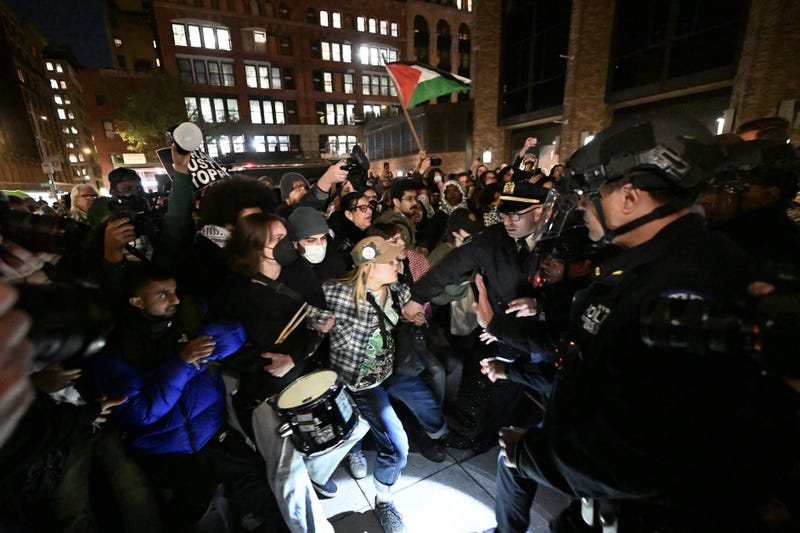
NEW YORK (1010 WINS/WCBS 880) -- Columbia University on Tuesday announced a hybrid learning option for the rest of the school year as campus protests over the Israel-Gaza war spread to NYU and lawmakers called for Columbia's embattled president to resign over antisemitism and disorder at the Ivy League school.
Columbia officials announced that students have the option to come to class at the Morningside Heights campus or keep working remotely. Classes are scheduled through Monday, while finals don't end until May 10.
“Safety is our highest priority as we strive to support our students’ learning and all the required academic operations,” the university said.
Former President Donald Trump said "what's going on at the college level—at the colleges Columbia, NYU and others—is a disgrace" as he arrived Tuesday morning at Manhattan Criminal Court for his historic hush money trial. "You have very radical people wanting to rip the colleges down, the universities down, and that's a shame."
Trump pinned the "mess" on President Joe Biden, who he said has "the wrong signal" and "the wrong tone." Trump said of his 2024 election rival: "The signals he puts out are so bad. And I can tell you, he's no friend of Israel, that's for sure. And he's no friend of the Arab world either."
Columbia's president, Minouche Shafik, has faced growing pressure amid fallout from the disruptive protests and antisemitism on campus.
New York's 10 Republican House lawmakers on Monday all called on Shafik to resign—just a week after she was summoned to Capitol Hill to testify on antisemitism at the school. GOP Sen. Tim Scott, of South Carolina, also urged her to step down.
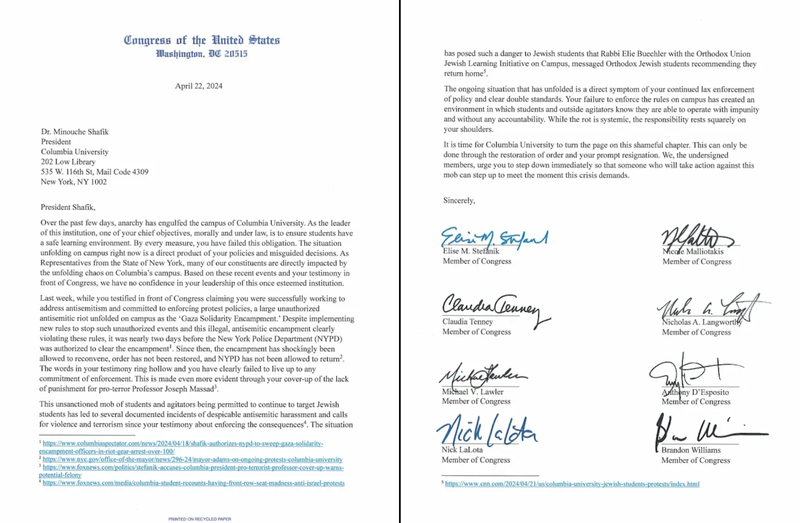
"Today I formally demanded [Columbia] President Shafik resign following her failure to put an end to the mob of students and agitators spreading antisemitism and calling for acts of terrorism against Jewish students at Columbia," posted upstate Rep. Elise Stefanik, who grilled Shafik at last week's hearing.
Several Democratic lawmakers have also pressed for her resignation, including Bronx Rep. Ritchie Torres and Sen. John Fetterman, of Pennsylvania.
"The cancellation of in-person classes at Columbia University is an admission of failure by President Minouche Shafik, who has chosen to surrender control of Columbia to an antisemitic fringe," Torres wrote on X.
"If you cannot ensure the safety of your students, then you have no business serving as President of any university, let alone the alma mater of Alexander Hamilton," Torres continued. " What Columbia University needs is not an appeaser of antisemitism but a leader who will fight with moral clarity against it."
"Add some tiki torches and it’s Charlottesville for these Jewish students," Fetterman wrote on X. " To Columbia President Minouche Shafik: do your job or resign so Columbia can find someone who will."
It was just a few months ago that the presidents of Harvard University and the University of Pennsylvania stepped down after a blistering congressional hearing on antisemitism.
A protest encampment has been spread across the main lawn of Columbia's campus for days, even after more than 100 people were arrested by the NYPD last Thursday at the college's request. Indeed, Shafik has also faced calls to resign from demonstrators and faculty who criticized those arrests.
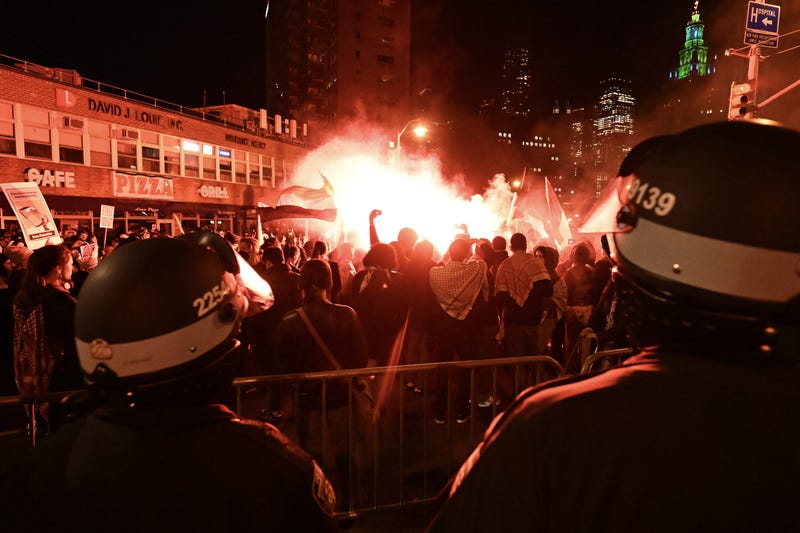
The protests have been happening for months—to the alarm of Jewish students, who have said they've felt intimidated, physically unsafe and abandoned by the school as antisemitic rhetoric has flared.
Meanwhile, in Greenwich Village on Monday night, 130 students and faculty were arrested outside Gould Plaza at NYU as protesters clashed with police in riot gear at an encampment there that organizers said was in solidarity with the one at Columbia.
Tension were high around 8:30 p.m. as protesters hurled bottles at the NYPD and some officers appeared to discharge pepper spray in the area of West Fourth Street.
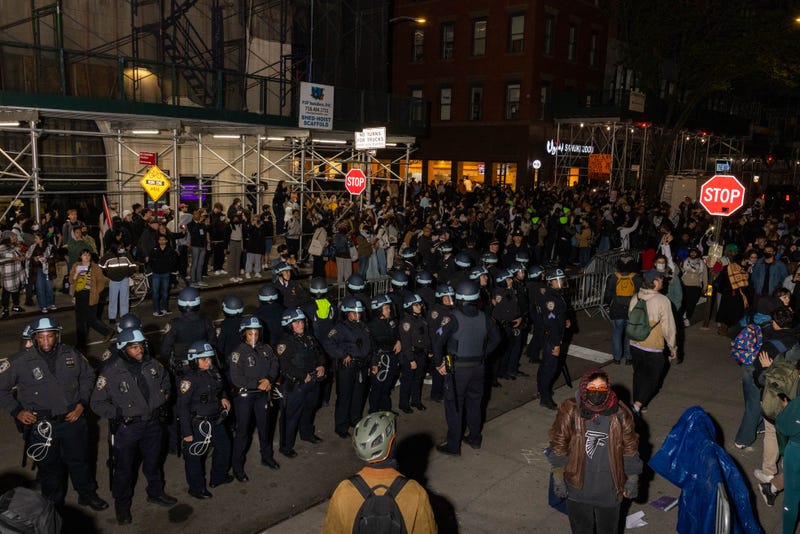
NYU's head of security said, " We witnessed disorderly, disruptive and antagonizing behavior that has interfered with the safety and security of our community."
NYPD Deputy Commissioner of Operations Kaz Daughtry said police were called to clear the demonstrators at the school's request.
"Unfortunately, as they were dispersing the crowd, some chose violence and pelted the police with bottles," Daughtry wrote on X. "The professionalism and composure our officers showed as they cleared the plaza — despite these dangerous acts of aggression they encountered — are to be commended."
Protests over the rising death toll in Gaza, where Israel's military has been battling Hamas since the Oct. 7 terrorist attacks, have spread to other colleges in the New York area, including the New School in Manhattan and Yale University in New Haven, where about 50 demonstrators were arrested Monday.
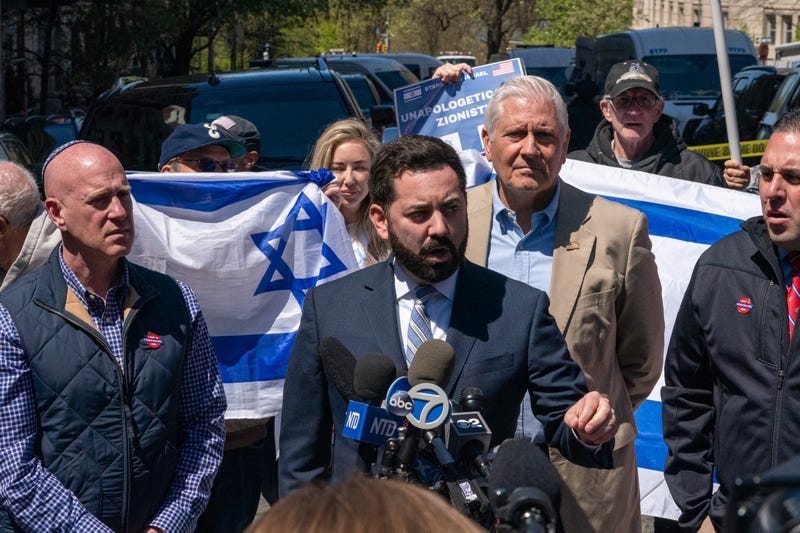
As the protests have grown, so too have concerns and outrage over antisemitism. It wasn't lost on many that Monday's clashes came as Jewish people marked the beginning of Passover.
NYPD officials said Monday that while there were no specific, credible threats to groups or individuals in connection with the Columbia protests, they were advising Jewish students heading to events off campus, such as Passover Seder, to use "safe corridor pathways" that police had set up.
"We told school officials where our officers will be stationed," Daughtry said.
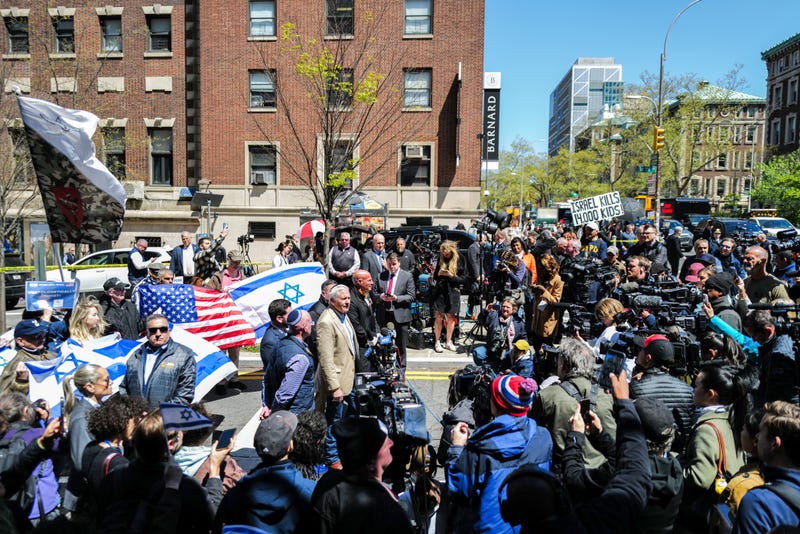
Meanwhile, Gov. Kathy Hochul convened a meeting between Columbia University leaders, City Hall and the NYPD to push back against antisemitism and protect public safety.
Democratic U.S. Reps. Dan Goldman, Josh Gottheimer and Jared Moskowitz also held a rally at Columbia in solidarity with Jewish students. Goldman stopped short of calling for Shafik's resignation, but he called the situation at the college "unacceptable."
"While everyone has a 1st Amendment right to protest, students do not have a right to threaten violence and cause fear within the Jewish community on campus," the congressman wrote on X.
